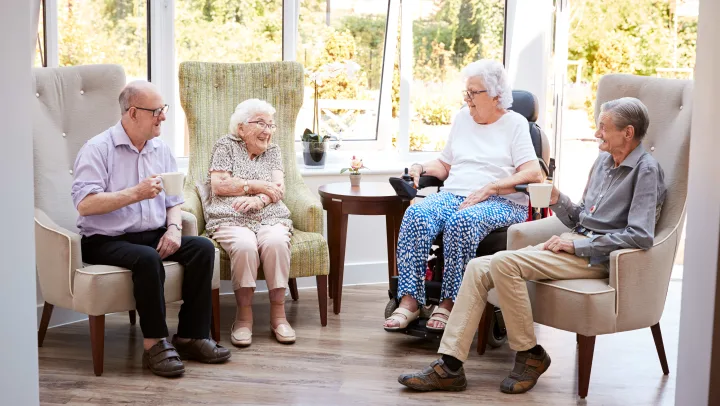Learn about customized Assisted Living services for elderly residents.
Learn about customized Assisted Living services for elderly residents.
Blog Article
Just How Aided Living Facilities Enhance Lifestyle for Those With Mental deterioration
The integration of engaging programs and family members involvement additionally improves the homeowners' experience. The complexities of mental deterioration treatment proceed to evolve, prompting a better examination of just how these centers adapt and innovate to meet the challenges dealt with by citizens and their households.
Personalized Treatment Plans
(Memory Care Facility Charlotte)In several cases, people with dementia need customized assistance that resolves their unique requirements and preferences. Customized treatment strategies are important in assisted living setups, as they make certain that each resident obtains ideal interest and solutions. These plans are developed collaboratively, including medical care professionals, caretakers, and household participants to produce an extensive introduction of the person's case history, cognitive capabilities, and individual rate of interests.
A well-structured individualized treatment plan usually includes particular objectives associated with wellness monitoring, everyday tasks, and social involvement. It makes up the person's cognitive decline while promoting freedom and self-respect. Regular evaluations and updates to the treatment plan are important, as they allow for alterations based upon the homeowner's advancing problem and preferences.
Key elements of these plans typically include medication monitoring, behavior assistance methods, and nutritional standards customized to the individual's needs (Assisted Living). By concentrating on customized treatment, helped living centers can cultivate a helpful environment that boosts the high quality of life for individuals with mental deterioration, eventually adding to their general well-being and happiness. This customized method appreciates the uniqueness of each local, guaranteeing they get the compassionate care they require

Involving Activities and Programs
Involving citizens in purposeful activities and programs is crucial for boosting the top quality of life for people with dementia. These tasks not just give satisfaction but also promote cognitive feature and promote social interaction, which can minimize feelings of seclusion commonly experienced by citizens.

Additionally, personalized programs are important in guaranteeing that each homeowner's distinct preferences and abilities are acknowledged. This tailored method motivates involvement, improves self-worth, and supplies a feeling of accomplishment.
In addition, regular analyses of citizens' passions can assist team change and adjust tasks to far better match advancing demands. By focusing on engaging activities and programs, helped living facilities can dramatically boost the overall experience and psychological health and wellness of individuals living with dementia.
Safe and Encouraging Setting
Developing a risk-free and supportive environment is crucial for individuals with dementia, as it directly influences their wellness and quality of life. Assisted living facilities are made with certain functions that promote safety and security while promoting a complacency and comfort. These environments focus on ease of access, with designs that decrease complication and encourage freedom, enabling residents to browse their environments much more conveniently.
Security actions, such as safe and secure entrances and departures, avoid wandering and unapproved accessibility, which are essential considerations for people with dementia (Memory Care). Team member are educated to recognize the one-of-a-kind needs of homeowners, supplying tailored support and guidance to ensure their security. The unification of calming shades and acquainted objects look what i found can aid decrease anxiousness and disorientation, creating a more soothing environment.
Along with physical safety and security, psychological support is vital. Facilities frequently use staff who are not only knowledgeable in caregiving but additionally trained in compassion and communication, promoting trust fund and relationship with locals. This all natural strategy contributes to a nurturing environment where individuals really feel valued and recognized, ultimately enhancing their overall lifestyle.
Social Communication and Neighborhood
An encouraging atmosphere not just focuses on safety and security but also fosters opportunities for social interaction and neighborhood involvement, which are vital for individuals with dementia. In nursing home, structured tasks and public spaces urge residents to connect with one another, decreasing feelings of isolation typically experienced by those with cognitive disabilities.
Social interaction plays a considerable function in improving emotional wellness and cognitive function (Memory Care). Involving with peers in team activities such as video games, arts and crafts, or workout not just stimulates cognitive abilities yet additionally nurtures a feeling of belonging. Facilities usually organize occasions that advertise socialization, allowing residents to construct partnerships and share experiences, which can be especially useful for those with dementia
Furthermore, a dynamic community ambience can improve the general lifestyle for homeowners. Personnel members are trained to promote communications and support homeowners in forming purposeful links. By creating a society of interaction, aided living centers aid individuals with mental deterioration preserve social skills and enhance their mood, ultimately adding to a much more meeting life experience. This community-oriented technique is crucial in handling the challenges linked with dementia, advertising a feeling of purpose and continuity for homeowners.
Family Participation and Assistance
Family participation is important in supporting individuals with mental deterioration in assisted living environments. Proactively involving relative not only provides psychological comfort to homeowners however additionally fosters a sense of belonging and connection in their lives. When families join care planning and everyday tasks, they contribute beneficial insights concerning the person's preferences, history, and needs, which can enhance tailored treatment.
Furthermore, routine family members visits can dramatically improve the emotional wellness of homeowners, reducing feelings of isolation and stress and anxiety. Household participants can additionally aid in maintaining cognitive feature by involving their enjoyed ones in familiar conversations and activities. This communication reinforces personal identity and helps locals feel valued and understood.

Conclusion
In conclusion, helped living facilities dramatically improve the top quality of life for people with dementia with personalized care plans, engaging activities, and a secure atmosphere. Jointly, these factors develop an alternative approach to care that addresses the special needs of individuals with dementia, promoting total wellness and self-respect.
Report this page